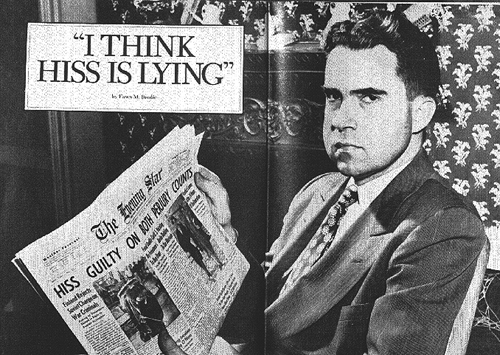Alger Hiss and the Changing Tide of Public Policy,
1938-1948
Suggestions for study and futher reading
by
Dr. Edward C. Papenfuse
State Archivist and Commissioner of Land Patents

©American Heritage, from an article by Fawn M. Brodie, "I Think
Hiss is Lying" The Launching of Richard Nixon, August/September 1981, Vol.
32, no. 5, pp. 4-22.
NOTE:
the references that follow are for personal, educational use only
and are not to be reproduced or distributed in any form without the
permission of the copyright holder.
I. Introduction:
Using web-based resources:
Wikipedia with Caution
Wikipedia article on Alger Hiss (accessed
June 22, 2006)
Wikipedia articles on Hiss related
articles, especially the Venona documents and Anatoly Gorsky
The cornerstone of post-war American Foreign Policy:
George Kennan, the "long telegram,"
February 1946 (transcription)
George Kennan, the "long telegarm,"
February 1946 (original)
George Kennan, Foreign Affairs
version of the "long telegram), 1947
Baltimore Boy Gone Bad?
Excerpts from the Johns Hopkins University
1926 yearbook with contemporary photograph.
Time Magazine, December 20, 1948
Speeches by Adlai E. Stevenson
on Alger Hiss and the United Nations from The Papers of Adlai E. Stevenson
"Let's Talk Sense to the American People," 1952-1955, Volume
4, edited by Walter Johnson. Boston: Little, Brown and Company, 1974, pp.
164-172.
II. useful web sites containing full bibliographies and references
Douglas Winder's Famous Trials at www.umkc.edu/famoustrials(last
accessed 2005/06/29), and specifically here.
The Alger Hiss Story (N.Y.U.) at http://homepages.nyu.edu/~th15/home.html
(last accessed 2005/06/29)
III. Additional sources for classroom use:
Doreen Rappaport, The Alger Hiss Trial.
New York: HarperCollins Children's Books, 1993. Note that this is
for educational use only and not for resale or redistribution. While
out of print, second hand copies can be obtained from the web and you are
encouraged to purchase them for classroom use.
Father John Cronin's 1945 confidential report
to Catholic Bishops on the threat of Communism in America. For
additional reading on Father Cronin, see John T. Donovan, Crusader in
the Cold War: A Biography of Fr. John F. Cronin, SS (1908-1994), a
dissertation at Marquette University, 2000.
Documents submitted in the Hiss trials
that led to his conviction for perjury, purported to have been given to
Whittaker Chambers by Hiss in 1938 with excerpts, table of contents of
HUAC hearings.
View John Lowenthal, The Trials of Alger Hiss 165
min., released 1980, ISBN -1-55974-239-9, as excerpts and the whole documentary:
Lowenthal excerpt
Feehan interpretation
The whole documentary as WMV files viewable through Microsoft's media player:
Part I
Part II
Part III
An inventory of a psychiatrist's files
Venona Documents controversy:
H-Net
Supports Venona indictment of Hiss
John Earl Haynes, Library of
Congress expert on Communism
Allen Weinstein, Perjury. The Hiss Chambers
Case. New York: Random House, 1997 (revision of 1978 edition),
Alger Hiss, 1980 article
For Whittaker Chambers see his play, his memoir Witness, and the definitive biography: Whittaker Chambers: A Biography by Sam Tanenhaus, Random House (1997).
For the continuing controversy over documenting whether or not Alger Hiss was a spy see: The Mystery of Ales, by Kai Bird and Svetlana Chervonnaya, in the Summer 2007 issue of the American Scholar.
The
bibliography of works relating to the Hiss/Chambers controversy is
extensive and only barely touched upon here. Two recent studies which
raise major questions about the ability of writers claiming to be
historians to objectively evaluate evidence include:
Susan Jacoby, Alger Hisss and the Battle for History, Yale University Press, 2009
G. Edward White, Alger Hiss's Looking Glass War, Oxford University Press, 2004.
